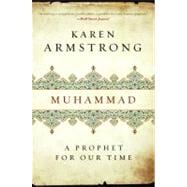The "New York Times" bestselling author of "A History of God" and "The Battle for God" presents a fascinating portrait of the founder of a religion that has changed the course of world history.
The Man Who Inspired the World's Fastest-Growing Religion
Muhammad presents a fascinating portrait of the founder of a religion that continues to change the course of world history. Muhammad's story is more relevant than ever because it offers crucial insight into the true origins of an increasingly radicalized Islam. Countering those who dismiss Islam as fanatical and violent, Armstrong offers a clear, accessible, and balanced portrait of the central figure of one of the world's great religions.
''Karen Armstrong’s sympathetic profile paints a portrait of a very human prophet '' - Wall Street Journal
''Respectful, knowledgeable, and, above all, readable. It succeeds because Armstrong brings Muhammad to life as a fully rounded human being.'' - The Economist
''A good glimpse of how the vast majority of the world’s Muslims understand their prophet.'' - New York Times








